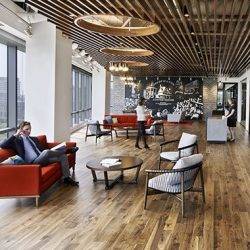January 29, 2018
Financial companies learning to better utilise office space to attract right talent
 Financial services organisations are reducing the amount of commercial office space they require as they adopt more flexible work styles. This is according to a new report from HOK’s US team, The New Financial Workplace, an investigation into the threats and challenges facing the financial services industry, with a special focus on how new technologies like cryptocurrency, biometrics and blockchain are disrupting the sector. Financial services companies are being challenged by the emerging fintech industry, says the report, which is projected to grow to $8 billion in 2018. These traditional companies must adopt the cultures and workplace design practices of the technology industry to stay ahead.
Financial services organisations are reducing the amount of commercial office space they require as they adopt more flexible work styles. This is according to a new report from HOK’s US team, The New Financial Workplace, an investigation into the threats and challenges facing the financial services industry, with a special focus on how new technologies like cryptocurrency, biometrics and blockchain are disrupting the sector. Financial services companies are being challenged by the emerging fintech industry, says the report, which is projected to grow to $8 billion in 2018. These traditional companies must adopt the cultures and workplace design practices of the technology industry to stay ahead.















 Three in 10 business professionals think most of their meetings are pointless and nearly half (48 percent) of UK business people admit to having dozed off in a meeting claims global research by Barco ClickShare. The study revealed the true extent of our shared dislike for business meetings, which many respondents believe are poorly run at best or, at worst, completely pointless. Nearly a third of respondents globally said they found less than half of their meetings to be useful, while 30 percent also said they had dozed off in a meeting before. The UK, in fact, led the way in the asleep-in-meeting stakes, with nearly half (48 percent) of all UK respondents saying they’d fallen asleep in meetings. Checking emails and social media during meetings was also extremely common and another indication of disengagement and distraction. Over 70 percent of people said they regularly checked emails during meetings, while 37 percent access social media.
Three in 10 business professionals think most of their meetings are pointless and nearly half (48 percent) of UK business people admit to having dozed off in a meeting claims global research by Barco ClickShare. The study revealed the true extent of our shared dislike for business meetings, which many respondents believe are poorly run at best or, at worst, completely pointless. Nearly a third of respondents globally said they found less than half of their meetings to be useful, while 30 percent also said they had dozed off in a meeting before. The UK, in fact, led the way in the asleep-in-meeting stakes, with nearly half (48 percent) of all UK respondents saying they’d fallen asleep in meetings. Checking emails and social media during meetings was also extremely common and another indication of disengagement and distraction. Over 70 percent of people said they regularly checked emails during meetings, while 37 percent access social media.






 Half of SMEs (50 percent) questioned in a new survey have changed the way that they recruit their staff as a result of Brexit. The Albion Growth Report 2017 of more than 1,000 SMEs suggests that for businesses which have changed their strategy as a result of Brexit, 15 percent have decreased recruitment resources, 10 percent have begun recruiting in different ways and 9 percent have made redundancies. A difficulty in finding skilled staff is one of the biggest barriers to growth, behind broader political uncertainty and cash flow, which the research claims could lead to a potential war for talent which is likely to become more intense in the post-Brexit environment. By contrast, SMEs view difficulty in finding unskilled staff as the least significant barrier to growth. The report finds that nearly two thirds (65 percent) of SMEs believe their business lacks expertise. More than a quarter (26 percent) of businesses lack marketing talent, followed by business planning (19 percent), IT (17 percent), and software developers and technology specialists (17 percent). Despite critical skills deficits, only a third of SMEs (33 percent) are currently hiring new employees.
Half of SMEs (50 percent) questioned in a new survey have changed the way that they recruit their staff as a result of Brexit. The Albion Growth Report 2017 of more than 1,000 SMEs suggests that for businesses which have changed their strategy as a result of Brexit, 15 percent have decreased recruitment resources, 10 percent have begun recruiting in different ways and 9 percent have made redundancies. A difficulty in finding skilled staff is one of the biggest barriers to growth, behind broader political uncertainty and cash flow, which the research claims could lead to a potential war for talent which is likely to become more intense in the post-Brexit environment. By contrast, SMEs view difficulty in finding unskilled staff as the least significant barrier to growth. The report finds that nearly two thirds (65 percent) of SMEs believe their business lacks expertise. More than a quarter (26 percent) of businesses lack marketing talent, followed by business planning (19 percent), IT (17 percent), and software developers and technology specialists (17 percent). Despite critical skills deficits, only a third of SMEs (33 percent) are currently hiring new employees.








December 22, 2017
Five employment law milestones from the past year we need to remember in 2018
by Lucy Gordon • Comment, Workplace
The past twelve months have been an eventful period for employment law; from the uncertainty surrounding Brexit and the rights of EU Nationals working in the UK, to the mounting attention on employee data protection as the GDPR edges ever closer. Issues of Employment Tribunal fees, holiday pay and the gig economy have similarly captivated headlines, and these significant milestones from the past 12 months are set to have a big impact on the challenges facing the sector into 2018. (more…)